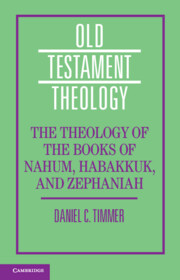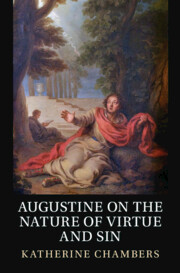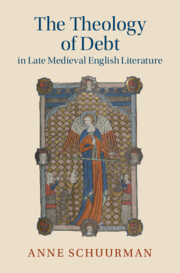108 results
8 - The Lost Sheep (Lk 15:1–7) and the Lost Coin (Lk 15:8–10)
-
- Book:
- Luke's Unique Parables
- Published online:
- 28 February 2025
- Print publication:
- 06 March 2025, pp 91-103
-
- Chapter
- Export citation
2 - The Parable of the Two Debtors (Lk 7:36–42)
-
- Book:
- Luke's Unique Parables
- Published online:
- 28 February 2025
- Print publication:
- 06 March 2025, pp 17-21
-
- Chapter
- Export citation
6 - The Barren Fig Tree (Lk 13:6–9)
-
- Book:
- Luke's Unique Parables
- Published online:
- 28 February 2025
- Print publication:
- 06 March 2025, pp 65-70
-
- Chapter
- Export citation
The problem with the problem of mourning
-
- Journal:
- Religious Studies , First View
- Published online by Cambridge University Press:
- 05 February 2025, pp. 1-11
-
- Article
- Export citation
2 - The Scriptural Story
- from Part I - The Story of God
-
- Book:
- Constructing an Incarnational Theology
- Published online:
- 09 January 2025
- Print publication:
- 23 January 2025, pp 24-58
-
- Chapter
- Export citation
6 - Modern Developments
- from Part II - An Emerging Story
-
- Book:
- Constructing an Incarnational Theology
- Published online:
- 09 January 2025
- Print publication:
- 23 January 2025, pp 136-164
-
- Chapter
- Export citation
10 - God’s Unbreakable Purpose
- from Part III - Reconfiguring the Story
-
- Book:
- Constructing an Incarnational Theology
- Published online:
- 09 January 2025
- Print publication:
- 23 January 2025, pp 244-281
-
- Chapter
- Export citation
6 - Personal Salvation
- from Part II - Paul Tillich and Personal Salvation
-
- Book:
- Salvation in the Block Universe
- Published online:
- 09 January 2025
- Print publication:
- 23 January 2025, pp 184-206
-
- Chapter
- Export citation
‘Hell? Yes!’ Moorean reasons to reject three objections to the possibility of damnation
-
- Journal:
- Religious Studies , First View
- Published online by Cambridge University Press:
- 18 December 2024, pp. 1-13
-
- Article
-
- You have access
- Open access
- HTML
- Export citation
16 - Theological Tensions in the Book of Isaiah
- from Part IV - Afterlives of the Book of Isaiah
-
-
- Book:
- The Cambridge Companion to the Book of Isaiah
- Published online:
- 08 November 2024
- Print publication:
- 21 November 2024, pp 261-280
-
- Chapter
- Export citation
Chapter 4 - The Theology of the Book of Zephaniah
-
- Book:
- The Theology of the Books of Nahum, Habakkuk, and Zephaniah
- Published online:
- 28 March 2024
- Print publication:
- 04 April 2024, pp 173-238
-
- Chapter
- Export citation
Chapter 5 - Conclusion
-
- Book:
- The Theology of the Books of Nahum, Habakkuk, and Zephaniah
- Published online:
- 28 March 2024
- Print publication:
- 04 April 2024, pp 239-246
-
- Chapter
- Export citation

The Theology of the Books of Nahum, Habakkuk, and Zephaniah
-
- Published online:
- 28 March 2024
- Print publication:
- 04 April 2024
5 - Devotional Experience
-
- Book:
- Ways of Living Religion
- Published online:
- 07 March 2024
- Print publication:
- 14 March 2024, pp 180-224
-
- Chapter
- Export citation

Augustine on the Nature of Virtue and Sin
-
- Published online:
- 10 January 2024
- Print publication:
- 23 November 2023

The Theology of Debt in Late Medieval English Literature
-
- Published online:
- 04 January 2024
- Print publication:
- 18 January 2024
3 - Political Vices?
-
- Book:
- Augustine on the Nature of Virtue and Sin
- Published online:
- 10 January 2024
- Print publication:
- 23 November 2023, pp 82-118
-
- Chapter
- Export citation
1 - Introducing the Issues
-
- Book:
- Augustine on the Nature of Virtue and Sin
- Published online:
- 10 January 2024
- Print publication:
- 23 November 2023, pp 1-44
-
- Chapter
- Export citation
4 - Augustine’s Definitions of Virtue
-
- Book:
- Augustine on the Nature of Virtue and Sin
- Published online:
- 10 January 2024
- Print publication:
- 23 November 2023, pp 119-162
-
- Chapter
- Export citation
On sin-based responses to divine hiddenness
-
- Journal:
- Religious Studies , First View
- Published online by Cambridge University Press:
- 20 November 2023, pp. 1-15
-
- Article
-
- You have access
- Open access
- HTML
- Export citation

